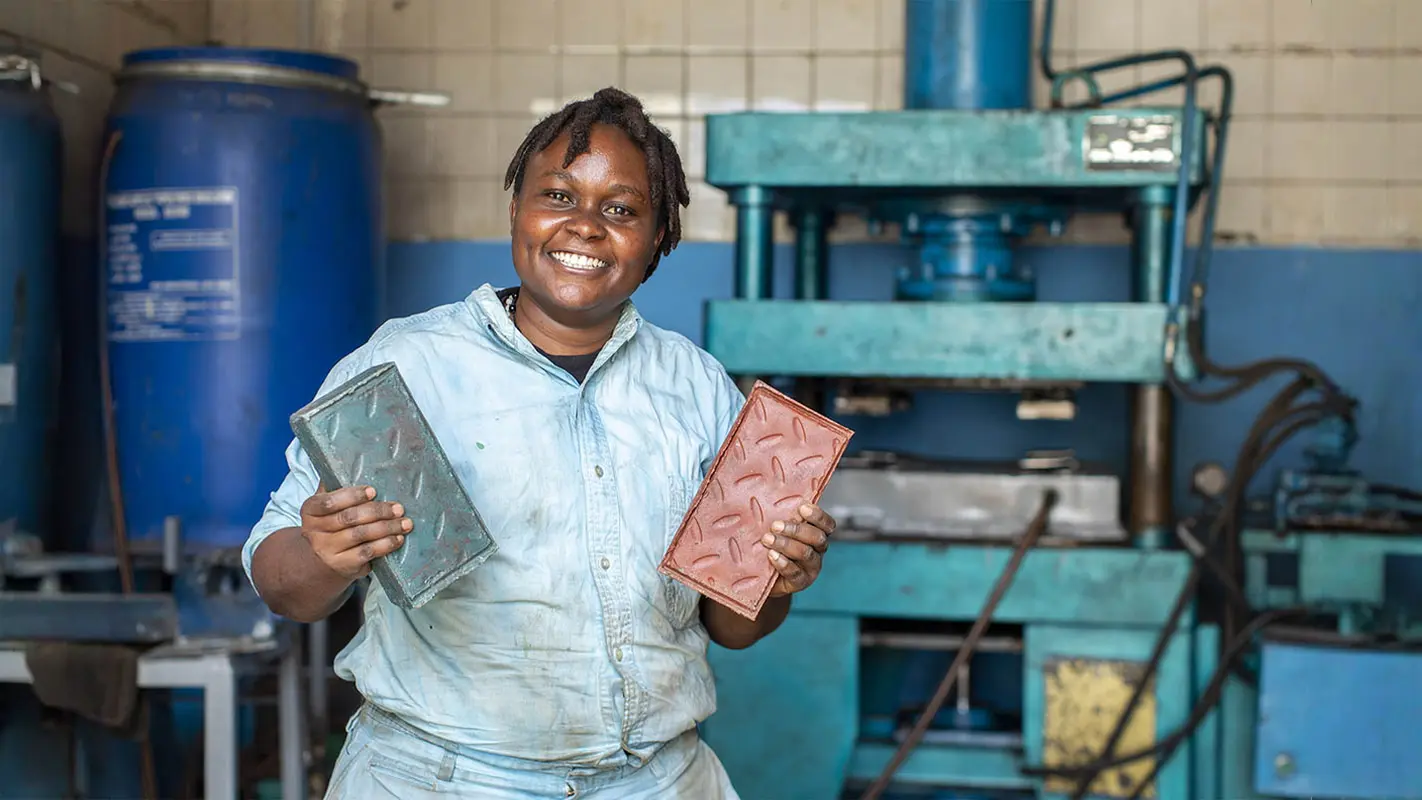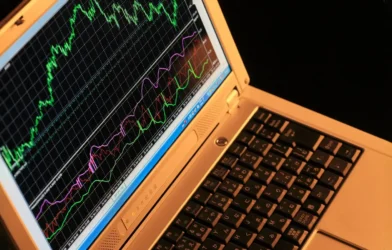Author: Aditya Pareek | EQMint | Sustainability News
Nairobi, November 1, 2025 — In a remarkable feat of innovation and sustainability, Gjenge Makers, a Kenyan startup, is redefining both waste management and construction. The company has developed a process that turns plastic waste into durable, affordable, and eco-friendly bricks — a material that is five times stronger and 30% cheaper than conventional concrete.
At a time when Africa is battling both a plastic pollution crisis and an affordable housing shortage, Gjenge Makers has emerged as a shining example of how sustainable innovation can address multiple social and environmental challenges simultaneously.
Turning Plastic Waste Into Building Power
Founded in Nairobi, Gjenge Makers collects non-recyclable plastic waste — such as single-use bags, packaging, and discarded containers — and transforms it into high-strength plastic-sand composite bricks.
These bricks are not only lightweight and waterproof but also remarkably durable, offering a sustainable and cost-effective alternative to traditional building materials.
The process involves shredding and melting plastic waste before mixing it with sand under carefully controlled conditions. The result: colorful, long-lasting bricks and pavers that can withstand extreme loads and harsh weather conditions.
“We wanted to turn one of Africa’s biggest environmental problems into a construction solution,” said Nzambi Matee, founder and CEO of Gjenge Makers. “Plastic waste is everywhere — in our streets, rivers, and landfills. Our mission is to give it new life, to turn pollution into a product of purpose.”
Five Times Stronger, Thirty Percent Cheaper
Independent laboratory tests show that Gjenge Makers’ plastic-sand bricks are five times stronger than concrete, capable of bearing greater weight and resisting damage from heat or water.
Even more compelling is their affordability — they are 30% cheaper to produce than standard concrete bricks. The reason lies in the simplicity and efficiency of the process: Gjenge Makers uses no water or cement during production, both of which are costly and environmentally intensive materials in traditional construction.
“Our production method reduces costs and cuts carbon emissions drastically,” explained Matee. “It’s circular, it’s sustainable, and it creates opportunity from what was once considered waste.”
By using discarded plastic as a raw material, the startup also prevents thousands of tonnes of waste from entering landfills or oceans each year.
Addressing Two Crises: Pollution and Housing
Africa faces two urgent challenges — an escalating plastic waste crisis and a massive housing deficit. The continent produces over 17 million tonnes of plastic waste annually, with less than 10% being recycled.
Meanwhile, the World Bank estimates that Africa needs over 50 million affordable homes by 2030 to accommodate rapid urbanization. Gjenge Makers’ solution directly bridges these two issues — turning one problem into the solution for another. Each ton of recycled plastic waste can create over 10,000 bricks, enough to build two small homes.
By converting plastic pollution into affordable housing materials, the company demonstrates how circular economy principles can drive both environmental and social progress.
Empowering Communities Through Sustainability
Gjenge Makers’ impact goes beyond technology — it’s transforming lives. The startup partners with local waste collectors and recycling groups, many of whom are women and young people from low-income communities.
These workers collect and sort plastic waste from streets, dumpsites, and landfills, which the company then purchases for processing. This approach creates steady income streams for informal waste workers, empowering them to participate in a cleaner, more inclusive economy.
“We are not just recycling plastic; we are rebuilding communities,” said Matee. “Every brick represents a cleaner environment and a livelihood for someone.”
The company’s decentralized production model — establishing micro-factories across cities — allows for scalable growth while keeping production local and cost-efficient.
Stronger Than Concrete, Kinder to the Planet
Traditional cement-based construction is among the world’s largest sources of carbon emissions, accounting for nearly 8% of global CO₂ output. Gjenge Makers’ innovative approach provides a compelling alternative.
Its plastic-sand composite bricks emit 60–70% less carbon during production compared to cement, require no water, and are built to last for decades. These bricks are resistant to cracking, erosion, and moisture, making them ideal for use in roads, pavements, and affordable housing. Their strength and durability have made them a preferred material for municipal infrastructure projects in Nairobi and beyond.
“Concrete has long been seen as the gold standard for construction,” said a Nairobi-based architect who has worked with Gjenge Makers’ materials. “But what they’ve created is even better — a brick that’s stronger, greener, and more accessible.”
Recognition and Global Impact
Gjenge Makers’ work has earned global recognition, including awards from the United Nations Environment Programme (UNEP) and features in Forbes, BBC, and Reuters for its groundbreaking approach to sustainable development.
Its founder, Nzambi Matee, was named a UN Young Champion of the Earth, one of the world’s most prestigious environmental honors. The startup is now collaborating with urban developers and governments to scale production across East Africa, with plans to expand into Ghana, Nigeria, and South Africa in the coming years.
“Our dream is to see this technology used across the continent — and the world,” said Matee. “If plastic waste is a global problem, then our solution should be a global one too.”
A Model for the Circular Economy
Gjenge Makers is more than a startup — it’s a blueprint for the circular economy in action. By transforming waste into wealth, the company exemplifies how environmental innovation can also drive economic empowerment and social impact.
Its model aligns with several UN Sustainable Development Goals (SDGs) — including SDG 9 (Industry, Innovation & Infrastructure), SDG 11 (Sustainable Cities & Communities), and SDG 12 (Responsible Consumption & Production).
Environmental expert Dr. Ama Osei, based in Ghana, praised the company’s approach:
“Gjenge Makers has turned a waste crisis into a resource revolution. It shows that sustainability can be local, profitable, and scalable — a lesson the world needs.”
Building the Future, One Plastic Brick at a Time
Gjenge Makers’ innovation is reshaping how the world views waste — not as an environmental burden, but as a valuable raw material for progress. In a continent where the need for affordable housing grows each year and plastic pollution continues to threaten ecosystems, this startup has built a bridge between sustainability and social equity.
As it scales across Africa, Gjenge Makers is proving that the future of construction doesn’t lie in concrete, but in creativity — and that a cleaner, greener planet can be built one plastic brick at a time.
For more such sustainability news visit EQMint
Disclaimer: This article is based on information available from public sources. It has not been reported by EQMint journalists. EQMint has compiled and presented the content for informational purposes only and does not guarantee its accuracy or completeness. Readers are advised to verify details independently before relying on them.









